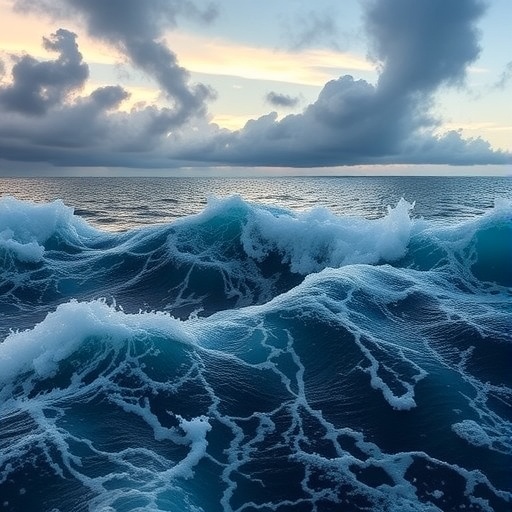Marine heatwaves (MHWs) have emerged as a significant aspect of climate change, representing a critical challenge for marine ecosystems and coastal communities. These elevated sea temperature events can have far-reaching effects, altering the distribution of marine species, disrupting food webs, and threatening the livelihoods of those who depend on ocean resources. In an intriguing new study by Hu and Wang, published in Commun Earth Environ, the authors delve into the vertical transitions of marine heatwaves and their intricate connections to seasonally varying atmospheric forces alongside local coastal upwelling systems.
Heatwaves in marine environments are not merely surface phenomena; they can manifest at different depths, profoundly influencing marine ecology. The crux of Hu and Wang’s research lies in understanding how specific atmospheric conditions and local oceanographic processes dictate the intensity, duration, and depth of these heatwaves. Their findings suggest that alterations in atmospheric conditions, influenced by seasonal transitions, play a pivotal role in shaping the vertical distribution of these heatwaves.
One of the most compelling aspects of this study is its exploration of the seasonal aspects of atmospheric forcing. The variation in wind patterns, solar radiation, and overall heat flux during different seasons can lead to diverse impacts on the ocean’s thermal structure. The researchers employed sophisticated modeling techniques to simulate how these seasonal atmospheric changes affect not only surface temperatures but also the deeper layers of the ocean.
Coastal upwelling, a process where deeper, cooler waters rise to the surface, is a critical factor in controlling marine temperatures. This phenomenon can mitigate the effects of heatwaves by bringing cooler water to the surface. However, the effectiveness of coastal upwelling is not uniformly distributed; it is heavily influenced by seasonal climate patterns. The study highlights regions where changes in upwelling dynamics due to climate variability could exacerbate or alleviate the impacts of marine heatwaves, showcasing the delicate balance between atmospheric conditions and oceanic processes.
The implications of these findings are profound, particularly in the context of global climate change. As atmospheric phenomena become increasingly erratic due to rising greenhouse gas concentrations, the associated changes in marine heatwaves could lead to more severe ecological consequences. The study underscores the need for comprehensive monitoring and predictive modeling to anticipate these transitions and prepare for their ecological and socio-economic impacts.
Importantly, Hu and Wang’s research does not just contribute to our understanding of marine heatwaves; it also provides valuable insights for fisheries management and marine conservation. By identifying the factors that influence the vertical distribution of heatwaves, policymakers and conservationists can better strategize efforts to protect vulnerable marine species and habitats.
Moreover, there is an urgency to disseminate this knowledge, as the detrimental impacts of marine heatwaves on fisheries could have drastic repercussions for food security and local economies. The findings of this study could serve as a catalyst for further research and discussion on adaptive management strategies that consider the complexities of both climate change and marine ecosystems, emphasizing the need for resilience in coastal communities.
In pursuit of a sustainable future, the intersection of climate science and marine ecology highlights the importance of interdisciplinary approaches. The work of Hu and Wang exemplifies how understanding the intricacies of marine heatwaves can guide future innovations in technology and policy to mitigate the impacts of climate change on our oceans.
As researchers continue to unravel the complexities of our oceans, the findings highlight the necessity of a collaborative approach to ocean resource management, emphasizing the role of scientific research in guiding sustainable practices. This study encourages scientists, policymakers, and communities to engage in dialogues about the pressing challenges posed by climate change, fostering a framework for collective action.
The urgency is further intensified by stark predictions from climate models, which indicate that marine heatwaves are expected to become more frequent and intense due to global warming. This alarming trend necessitates immediate action to curb greenhouse gas emissions and promote sustainable practices across various sectors. The research conducted by Hu and Wang serves as a crucial reminder that proactive measures are essential in safeguarding marine biodiversity and coastal livelihoods.
There is a growing recognition that public awareness and education about the impacts of marine heatwaves are paramount. By transforming complex scientific knowledge into accessible information, researchers can empower communities to take proactive steps in adapting to the changing oceans. The interplay between climate dynamics and marine ecosystems is not a distant concern; it is a pressing reality that requires collective responsibility and action.
In conclusion, Hu and Wang’s investigation into the vertical transitions of marine heatwaves provides a comprehensive understanding of the interactions between atmospheric forces, oceanographic processes, and ecological consequences. As marine heatwaves continue to evolve in response to climate change, the implications for marine life and human societies become increasingly urgent. This study encourages ongoing research and community engagement to foster resilience in the face of environmental changes.
Subject of Research:
Article Title: Vertical transitions of marine heatwaves influenced by seasonally varying atmospheric forcing and coastal upwelling system.
Article References:
Hu, Y., Wang, C. Vertical transitions of marine heatwaves influenced by seasonally varying atmospheric forcing and coastal upwelling system.
Commun Earth Environ 6, 911 (2025). https://doi.org/10.1038/s43247-025-02853-6
Image Credits: AI Generated
DOI: https://doi.org/10.1038/s43247-025-02853-6
Keywords: Marine heatwaves, climate change, atmospheric forcing, coastal upwelling, marine ecosystems.




